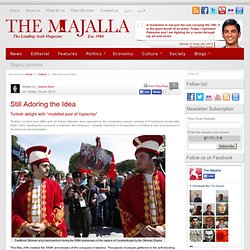

Youtube. ‘You can be anything in Ireland now, except English’ “Ireland is an unknown place to a lot of British people,” says Charlotte Matabaro, who was 15 when she moved from London to rural Co Tipperary, in 1995.

“You’re taught a very different history in British schools. When you come here and hear the other side, you have to take a step back. You have to re-educate yourself.” The Holocaust. Nightmare in Berlin by Hans Fallada review – a compelling portrait of postwar Germany. Hans Fallada’s career was chaotic and disastrous.

Posterity is lucky to rescue anything from the long catastrophe.
Walter Benjamin On the Concept of History /Theses on the Philosophy of History. Africa. A house in Shoreditch damaged by a Zeppelin raid, ... Veterans of Britain's anti-apartheid movement remember how they rebuilt themselves around Mandela. The Tower Bridge from a drawing by C.W.Wyllie ... St Vincent and Grenadines prepares to confront dark history of slavery in court. St Vincent and the Grenadines.
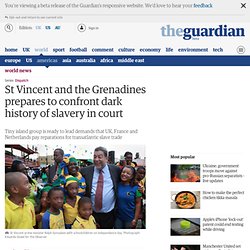
A string of islands that stands out in Caribbean holiday brochures as the destination with the most turquoise of waters, the most pristine of white-sand beaches. Home to the ultra-exclusive private island and celebrity hangout Mustique. Yachting paradise. Enduring Exile by Alia Malek. A family’s journey from Armenia to Syria and back again.
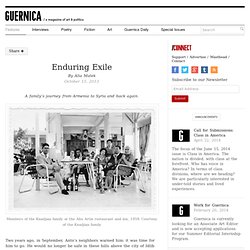
Members of the Knadjian family at the Abu Artin restaurant and inn, 1959. Courtesy of the Knadjian family Two years ago, in September, Anto’s neighbors warned him: it was time for him to go. He would no longer be safe in these hills above the city of Idlib in northwestern Syria. Propaganda at the British Library: Read between the lines.
Cuba. Catholic Church. African, Latino, Native, & Asian America. A history of pirates: Eye on the main chance. Rachel Shteir Reviews Jill Lepore's "The Story Of America: Essays On Origins" ASKED ABOUT HER busy career, Harvard professor and frequent New Yorker contributor Jill Lepore recently said, “Either you’re going to run out of breath or you’re going to trip.”

(She also has a family and has written six books.) In her latest offering, The Story of America, a collection of essays mostly published in The New Yorker, the history professor has tripped. Lepore started writing for The New Yorker in 2005 and since then has filed 86 pieces—blogs, comments, essays, reviews—for the magazine. That is impressive, at least quantitatively speaking. The leap from scholarly writing to magazine deadlines is sort of like the leap from cross-country skiing to downhill. Lepore starts out with a good subject. Support thought-provoking, quality journalism. This scolding skepticism occasionally works. Lepore also can be scholarly in a good way when she reminds readers that Colonial Americans are not just twenty-first century ones wearing funny hats.
Hobsbawm and the CPGB. Eric Hobsbawm, Peter De Francia, c.1955.
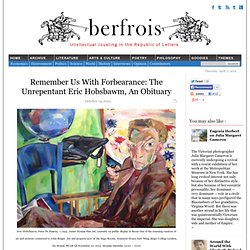
James Hyman Fine Art, currently on public display in Room One of the stunning curation of art and archives connected to John Berger, ‘Art and property now’ at the Inigo Rooms, Somerset House East Wing, King’s College London, the Strand, WC2R till November 10, 2012. Monday-Saturday 13:00 – ! 9:00. Saddam Hussein's Speeches on Democracy (1977-1978) By Maria Popova “The question of democracy is an extremely complicated one.
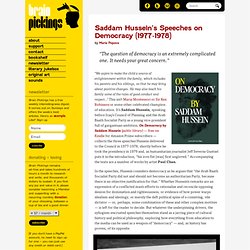
It needs your great concern.” “We aspire to make the child a source of enlightenment within the family, which includes his parents and his siblings, so that he may bring about positive changes. He may also teach his family some of the rules of good conduct and respect…” This isn’t Maria Montessori or Sir Ken Robinson or some other celebrated champion of education. It’s Saddam Hussein, speaking before Iraq’s Council of Planning and the Arab Baath Socialist Party as a young vice-president full of gargantuan ambition.
In the speeches, Hussein considers democracy as he argues that “the Arab Baath Socialist Party did not and should not become an authoritarian Party, because there is no objective justification for that.” Literature Against the French. King Louis Napoléon by Lotte Jensen To what extent can literature be used as a source for gaining historical knowledge? [1] This question has challenged historians and literary historians ever since the development of ‘history’ as a scholarly discipline. The answer tends to be moderately positive: literature may reveal specific information that can increase our historical knowledge of a certain time, but we should always take the specific character of literature into account.[2] In some cases, however, literature seems to be indispensable for a correct view of a certain period.
This article discusses the case of Dutch resistance literature between 1806 and 1813 and argues that studying this type of literature fundamentally changes our perspective on these years. Status Quaestionis. Still Adoring the Idea. Turkish delight with “muddled pool of hypocrisy” Turkey’s current love affair with all things Ottoman was captured by the massively popular release of it historical blockbuster Fetih 1453, charting the conquest of Istanbul, this February – despite criticisms of its depictions of violence and inaccuracies in its historical representation.
